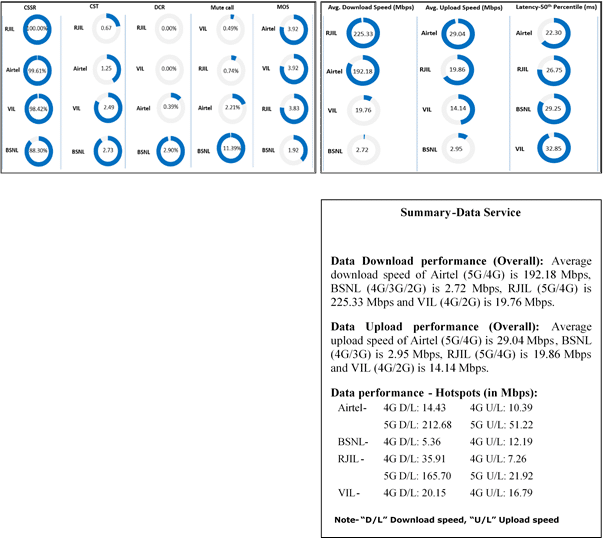TRAI Evaluates Network Quality in Sangli City and on Sangli – Bengaluru Railway Route in Maharashtra

The Telecom Regulatory Authority of India (TRAI) has unveiled its Independent Drive Test (IDT) results for the Maharashtra Licensed Service Area, focusing on mobile network performance across various environments. Conducted from June 2 to June 6, 2025, the tests spanned urban areas, highways, and railway routes, assessing technologies from 2G to 5G. The findings highlight the performance of major telecom service providers (TSPs) in Sangli City, offering insights into voice and data services.
Comprehensive Testing Across Diverse Locations
During the testing period, TRAI teams covered an extensive area, including 375.5 kilometers of city driving, 741.1 kilometers along the railway route from Sangli to Bengaluru, and 11.4 kilometers of walking segments. The tests were conducted in various environments, such as high-density neighborhoods and key public locations, including educational institutions and transport hubs. The aim was to capture real-world mobile network performance under different usage scenarios. The evaluation included 12 hotspots and focused on the user experience in both stationary and mobile contexts.
The drive tests were supervised by the TRAI Regional Office in Bengaluru, utilizing calibrated equipment and standardized protocols to ensure accuracy. The results have been shared with all relevant telecom service providers, allowing them to understand their performance metrics and areas for improvement.
Key Performance Indicators Assessed
TRAI’s assessment focused on several critical parameters for both voice and data services. For voice services, the key metrics included Call Setup Success Rate (CSSR), Drop Call Rate (DCR), Call Setup Time, Call Silence Rate, Speech Quality (Mean Opinion Score), and overall coverage. In terms of data services, the evaluation looked at download and upload throughput, latency, jitter, packet drop rate, and video streaming delay.
The results indicated that Airtel, BSNL, RJIL, and VIL had varying success rates in call setups, with RJIL leading at 99.41%. The drop call rates also varied, with Airtel showing the best performance at 0.13%. In terms of data services, 5G technology delivered impressive peak download speeds of 680.11 Mbps and upload speeds of 78.33 Mbps in city hotspots, showcasing the advancements in mobile technology.
Detailed Findings on Voice and Data Services
The detailed findings revealed that Airtel achieved a Call Setup Success Rate of 87.31%, while BSNL, RJIL, and VIL recorded rates of 84.76%, 99.41%, and 90.80%, respectively. The Call Setup Times varied, with Airtel taking an average of 1.20 seconds, while BSNL took 2.68 seconds. The Drop Call Rates were notably low for Airtel and RJIL, at 0.13% and 0.36%, respectively.
For data services, the average download speeds were significantly different among providers. Airtel led with an average download speed of 103.45 Mbps, while BSNL lagged at just 1.04 Mbps. The upload speeds also reflected this disparity, with Airtel achieving 22.43 Mbps compared to BSNL’s 2.83 Mbps. The performance in hotspot areas further illustrated these differences, with RJIL’s 5G service providing the highest download speeds.
Observer Voice is the one stop site for National, International news, Sports, Editor’s Choice, Art/culture contents, Quotes and much more. We also cover historical contents. Historical contents includes World History, Indian History, and what happened today. The website also covers Entertainment across the India and World.

